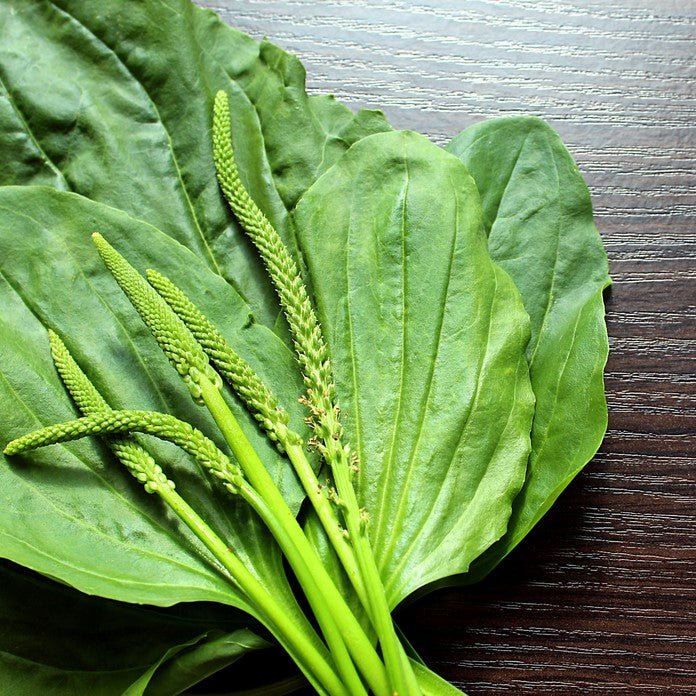Plantain Herb- All the Health Benefits

Share
Plantain Herb
Plantago major (Broadleaf Plantain) and Plantago lanceolate (Narrowleaf Plantain) are species of flowering plants in the plantain family Plantaginaceae that are commonly used as herbal medicines. Plantain (not to be confused with the green banana-like fruit with the same name) is native to most of Europe and northern and central Asia, but has widely naturalized elsewhere in the world, including across North America. The young, tender leaves can be eaten raw, and the older, stringier leaves can be boiled in stews and eaten.
Plantain herbal extract is a key ingredient in our Lung Detox Tonic due to the herb's potent respiratory benefits.
Plantain Herb: Effects
So, what is plantain? is a common weed of cultivated pastures, cracks in sidewalks, backyard gardens, and any place that experiences regular activity. The medicinal benefits of plantain have been acknowledged around the world for hundreds of years. This plant contains a number of effective chemical constituents including flavonoids, alkaloids, terpenoids, phenolic acid derivatives, iridoid glycosides, fatty acids, polysaccharides and vitamins which contribute to its exerting specific therapeutic effects. Correspondingly, studies have found that Plantago major is effective as a wound healer, as well as an antiulcerative, antidiabetic, antidiarrhoeal, anti-inflammatory, antifungal, antinociceptive, antibacterial, and antiviral agent. It also combats fatigue is an antioxidant and a free radical scavenger.
Plantain also has a history of use for treating respiratory ailments as it reduces mucus secretion in the airways, which makes it helpful in treating colds, catarrh, sinusitis, lung and bronchial allergic conditions such as hay fever and asthma.
Other Plantain Benefits
Animal studies have suggested that Plantago lanceolata extract may aid in wound healing potentially due to its anti-inflammatory, anti-bacterial, anti-fungal, anti-oxidant, and anti-ulcerative properties. It may also act as a pain reliever (analgesic agent), as well as exhibit immunomodulatory properties (relating to the immune system).
The most important components of Plantago lanceolata leaves are bioactive compounds such as catalpol, aucubin, and acteoside. These compounds possess different pharmacological effects: anti-inflammatory, antioxidant, antineoplastic, and hepatoprotective.
In a study published in the journal Biotech and Histochemistry, researchers examined Plantago lanceolata and Plantago major (P. major) and found that both plants provided significant wound-healing potential.
It was found that amongst the parts of the plantain plant, the seeds exhibited the greatest antiproliferative activity, meaning that they inhibited cell growth on tumor cells the best. The roots exhibited comparable antiproliferative and cytokines-inhibition activities to those of the leaves. (Cytokines are a number of substances secreted by certain cells of the immune system that have an effect on other cells).
In her book The Top 100 Herbal Remedies, Annie McIntyre points to the plant’s ability to act as a mild blood cleanser, reducing toxin-based health issues. An infusion of plantain can be used in eye compresses, spritzed on a sunburn, applied to itchy skin and rashes, and dabbed on acne and eczema. When consumed internally, it may help with colds, sore throats, allergies, sinus, chest congestion, and some digestive issues. As an edible plant, it’s a good source of bioavailable zinc, calcium, and beta-carotene. The plant can be eaten raw or cooked and used dried or fresh.
References
https://www.sciencedirect.com/science/article/abs/pii/S0378874117321852?via%3Dihub
https://www.ncbi.nlm.nih.gov/pmc/articles/PMC5878035/
https://www.ncbi.nlm.nih.gov/pmc/articles/PMC3924996/